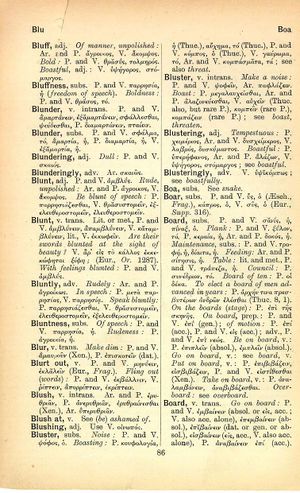boa
English > Greek (Woodhouse)
subs.
See snake.
Latin > English (Lewis & Short)
bŏa: (also bŏva in the MSS. of Pliny and Festus), ae, f. bos; cf. βουβών,
I a large Italian serpent: in Italiă appellatae bovae in tantam amplitudinem exeuntes ut divo Claudio principe occisae in Vaticano solidus in alvo spectatus infans, Plin. 8, 14, 14, § 37; 30, 14, 47, § 138 sq.; Sol. 2; acc. to Paul. ex Fest. p. 30 Müll., a water-serpent, so called because it milked cows, Sol. 2, 33; or because it could swallow an ox, quas boas vocant, ab eo quod tam grandes sint ut boves gluttire soleant, Hier. Vit. Hil. Erem. 39.—
II A disease producing red pustules, the measles or small-pox, Plin. 24, 8, 35, § 53: boam id est rubentes papulas. id. 26, 11, 73, § 120: boas fimum bubulum abolet: unde et nomen traxere, id. 28, 18, 75, § 244; Lucil. ap. Fest. s. v. tama, p. 360 Müll.—
III Crurum quoque tumor viae labore collectus bova appellatur, Paul. ex Fest. p. 30 Müll. (the same author explains with these words the disease tama).
Latin > French (Gaffiot 2016)
(1) bŏa (bŏva, bŏas), æ, m.,
1 le serpent boa : Plin. 8, 37
2 enflure des jambes par suite d’une marche pénible : P. Fest. 30 || rougeole [maladie] : Plin. 24, 53.

